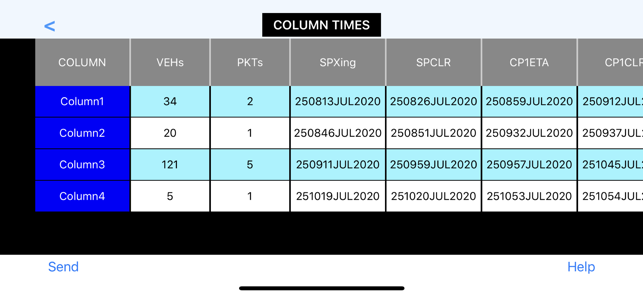價格:免費
更新日期:2020-07-28
檔案大小:3.2 MB
目前版本:2.1.1
版本需求:系統需求:iOS 11.0 或以後版本。相容裝置:iPhone、iPad、iPod touch。
支援語言:英語

MOVERTIMES Version 2.1.1

MoverTimes is aimed at organisations that need to plan ground based logistics when transporting by road. It is a vehicle movement planning utility that produces a set of column movement times along a pre-designated route. Outputs are a series of tables displayed as date time groups that can be used to plan the movement of single ground vehicle to many hundreds of vehicles as part of a convoy. Three setups can be used to calculate date time groups: UK, International (based on UK) and US. Each uses parameters relevant to the country way of working.

All setups includes: start time required, end time required, start date required, end date required, column gap, column speed, total route distance, distance between checkpoints, halt times, checkpoint open/closed, column names, vehicle quantities, individual column start, individual column speed. UK /International also includes: vehicle density, packet size, packet gap and road type. US setup also includes: march unit size and gap, serial size and gap, vehicle length and gap. All these parameters can be changed quickly to provide different planning options and scenarios for the same route. Many routes can be created each with large numbers of columns and vehicle quantities.

Two results tables showing date-time groups are produced: an all-columns table and an individual column-packet/march unit table. All tables can be scrolled up/down, side-to-side and emailed as attachments from within MoverTimes as csv files for spreadsheet applications.

Saved routes, with associated units, times and defaults, can be sent as zip files using the internal email facility to any other planner using MoverTimes. Incoming zip files are loaded using the device email.

MoverTimes consists of five pages to provide data entry and controls: Mover page, Control page, Columns/Vehicles page, Edit Routes page and Results page.

The Mover page is the start screen used to create new routes, select existing routes from a scrollable list, delete routes from that list, send zip routes and set defaults for new routes and new columns. Existing routes are displayed in alphabetical order, numbers taking precedence. Each route can be individually deleted or all routes can be deleted in one go.

The Control page is the area where the overall system parameters are set and used by the results engine in place of individual parameters set by the columns/vehicles page. Overall system parameters include times and dates which can be inserted/changed, checkpoints closed/opened, halt times inserted/changed, road types selected and route parameters set. In addition the route can be copied by simply editing the route name displayed; the original route is kept and a new route with the new name is produced.
The Columns/Vehicles page is used to enter column names, vehicle quantities,
individual column start times, individual column speeds and, for the US set up, march unit size/gap, serial size/gap and vehicle length/gap. A special ‘use default’ marker X can be used in place of any specific parameter. For planning purposes columns can be moved up and down, removed or added to the list so their timings along the route reflect where they are in the list relative to other columns.
The Edit Route page is used to change existing routes and the total distance. From here checkpoints can be added, removed or inserted into the route and halt times entered. Each route automatically includes a start point (SP), multiple numbered checkpoints (CP) and a release/rendezvous point (RP). Total distance, as well as distance between check points, can be edited and checkpoints can be inserted or removed.
The Results page provides the tables of times results. Once displayed each column name can be selected to get that unit timings plus individual packets times. From here csv files can be emailed as attachments using the internal email facility.
支援平台:iPhone, iPad
